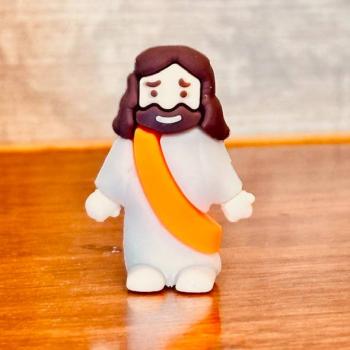The significance of Jesus’ death for first-century Jews and the Roman Empire cannot be overstated. It was a catalyst for profound religious, social, and political transformations. For the Jewish community, it represented a theological shift and the genesis of a new religious movement. For the Roman Empire, it marked the beginning of a religious revolution that would ultimately reshape the entire Western world. Jesus’ crucifixion, an event rooted in the historical context of Jewish-Roman relations, thus stands as a monumental turning point in the annals of history.
Considering two Accounts
I want to consider two accounts of the Resurrection from the Gospels, Mathew 28 and Mark 16. Both accounts offer unique perspectives on this pivotal event, contributing to a richer, more nuanced understanding of the resurrection’s significance. These narratives, though distinct in tone and emphasis, converge on the transformative power of the resurrection, which served as the cornerstone for the nascent Christian faith and the driving force behind the early church’s mission.
For the Jewish people living in first century Palestine, Jesus’ death was a deeply significant religious event. Breaking from the Jewish tradition that shaped their initial faith, the early followers found Jesus to be their Messiah, a figure prophesied in Jewish scriptures to deliver and redeem Israel. For the Jews who did not continue to follow Jesus’ teachings, they found his crucifixion to be a source of profound sorrow and confusion for they were hoping for a political and military leader who would liberate them from Roman oppression. This event led to a theological re-evaluation among his followers, who came to believe that Jesus’ suffering and death were part of a divine plan for spiritual salvation rather than earthly liberation.
The Romans too would be impacted through Jesus’ execution. Although initially a minor event in the vast expanse of the Roman Empire, Jesus’ death and the subsequent spread of Christianity had profound religious implications. As Christianity spread throughout the empire, it began to challenge the traditional Roman polytheistic beliefs and the authority of the state-sponsored religious institutions. Finaly by the end of the fourth century after Rome could no longer control the new Christian sect, Christianity would become the dominant religion, fundamentally transforming the religious landscape of the empire.
If we turn specifically to the Gospel accounts written many years after his death, we get two differing accounts. Considering Mathew’s account, we find a more authoritative and conclusive account, emphasizing Jesus’ power and the clear mandate given to his followers to spread the gospel to all nations. It highlights the overcoming of opposition (the guards’ lie) and the establishment of Jesus’ universal reign.
Mark on the other hand (in its original ending) leaves the reader with a sense of the women’s initial fear and perhaps the unexpected nature of the resurrection. It emphasizes obedience to the instruction to meet Jesus in Galilee. The later, added endings attempt to provide a more complete narrative similar to the other Gospels. Mark has an immediacy to it, perhaps closely aligned more with Jesus’ notion of eschatology.
The differences in these accounts reflect the distinct purposes and audiences of each Gospel writer. Matthew, writing for a primarily Jewish audience, emphasizes Jesus’ authority as the promised Messiah and the universality of his mission. Mark, often considered the earliest Gospel, may have focused on the initial shock and the call to obedience, with the full implications of the resurrection unfolding later. The abrupt ending of the earliest Mark has been a subject of much scholarly debate.
The Fallout
Jesus’ crucifixion and death created a problem for all the players at the time. The Romans, the Jewish people and the followers of Jesus all interpreted Jesus’ death differently. Its consequences reverberated through religious, social, and political spheres, shaping the course of history in ways that were both immediate and long-lasting. The aftermath of Jesus’ death saw the emergence of a new sect within Judaism—those who followed Jesus’ teachings and believed in his resurrection. This group, initially a small, Jewish-based community, began to grow and spread, eventually evolving into Christianity. The early Christians faced significant persecution from both Jewish authorities and Roman rulers, as their beliefs were seen as radical and threatening to established religious and social norms.
The spread of Christianity brought significant social changes within the Roman Empire. It provided a sense of community and belonging to various marginalized groups, including slaves and women, who found solace and equality in the teachings of Jesus. This shift contributed to the gradual transformation of Roman society, promoting values of charity, humility, and brotherhood that contrasted sharply with the prevailing Roman ethos of power and hierarchy.
The church’s Mission
The Resurrected Christ challenges us to go and tell.
The church’s mission, which is rooted in the resurrection and the profound transformation it signifies, calls every believer to action. The early church, inspired by the victory over death and the promise of eternal life, embarked on a relentless pursuit to share the gospel. This evangelistic zeal was not mere enthusiasm, but a response to the divine mandate. The early disciples, though facing persecution and death, demonstrated unwavering faith and courage and over the centuries, would spread the message of salvation across diverse cultures and regio followers in a small town in the Middle East would eventually transcended geographical and cultural boundaries, setting a precedent for future generations. Their call to ‘go and tell’ remains as relevant today as it was in the first century, urging modern believers to continue the mission with the same fervor and dedication. In embracing this mission, we honor the legacy of the early church and partake in the transformative power of the resurrection, shaping our lives and the world around us.
Despite the decline and lack of relevance to some, we still need church today. Church gives us moral definition and builds community. It is a beacon for hope, standing in the town square as a beacon, calling us poor sinner’s home. The church is a hospital too. A place where the Balm of Gilead can be applied and our sin sick souls, our heavy burdens can be placed at the cross and we can be reminded that we do not have to walk this path alone.
















